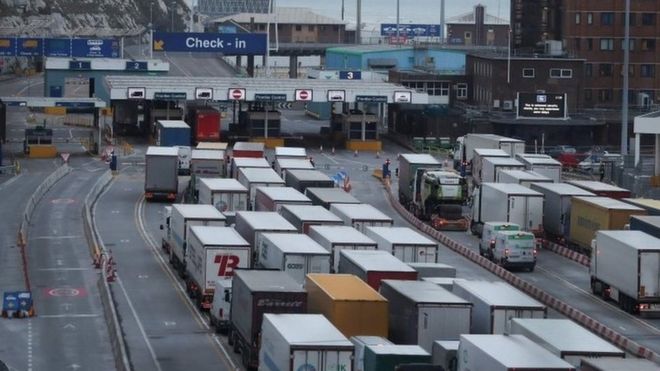 PA MEDIA
PA MEDIA
There is a risk of riots, rises in food prices and reduced medical supplies if the UK leaves the EU without a deal, a government document has suggested.
Ministers have published details of their Yellowhammer contingency plan, after MPs voted to force its release.
It outlines a series of "reasonable worst case assumptions" for the impact of a no-deal Brexit on 31 October.
However, ministers have blocked the release of communications between No 10 aides about Parliament's suspension.
Cabinet minister Michael Gove said MPs' request to see e-mails, texts and WhatsApp messages from Dominic Cummings, Boris Johnson's chief aide, and eight other advisers in Downing Street were "unreasonable and disproportionate".
Publishing the information, he added, would "contravene the law" and "offend against basic principles of fairness".
 REUTERS
REUTERS
The government sought to resist the publication of the Operation Yellowhammer document, but lost a vote in the Commons on Monday, prior to the suspension of Parliament, compelling it to do so.
The six-page document, dated 2 August and leaked to the Sunday Times last month, warns of disruption at Dover and other channel crossings for at least three months; an increased risk of public disorder; and some shortages of fresh food.
Among its other key points are:
- Certain types of fresh food supply "will decrease"
- Protests and counter protests will take place across the UK
- Lorries could have to wait more than two days to cross the Channel
- Some businesses will cease trading
- There will be a growth in the black market
- Some providers of adult social care could fail
The document also warns of potential clashes if foreign fishing vessels enter British territorial waters on the day after the UK's departure and says economic difficulties could be "exacerbated" by flooding or a flu pandemic this winter.
The BBC's Chris Mason said some of the scenarios outlined were "stark", but ministers were insisting the paper was not a prediction about what will happen.
The document, which, until now, was categorised as "official, sensitive", is not an official cabinet paper. It dates from 10 days after Mr Johnson became prime minister.
- Judges rule Parliament suspension is unlawful
- How does prorogation happen?
- What is the UK doing to get ready for a no-deal Brexit?
MPs voted on Monday to order the release of all internal correspondence and communications, including e-mails, texts and WhatsApp messages, between nine No 10 advisers relating to Parliament's suspension.
But the government has said it will not comply with the MPs' request, citing potential legal breaches of data protection and employment rights.
'Right of reply'
Mr Gove said the legal advice received by Mr Johnson before requesting the prorogation of Parliament was in the public domain after being disclosed as part of the ongoing court cases, but there was no justification for the "far broader" information being sought.
"To name individuals without any regard for their rights or the consequences of doing so goes far beyond any reasonable right of Parliament under this procedure.
"These individuals have no right of reply, and the procedure used fails to afford them any of the protections that would properly be in place.
"It offends against basic principles of fairness and the Civil Service duty of care towards its employees," he said.
He said it was ministers, not civil servants or special advisers, who were ultimately accountable to Parliament for decisions taken.
The request, therefore was "inappropriate in principle and in practice, would on its own terms purport to require the government to contravene the law, and is singularly unfair to the named individuals".

No comments:
Post a Comment